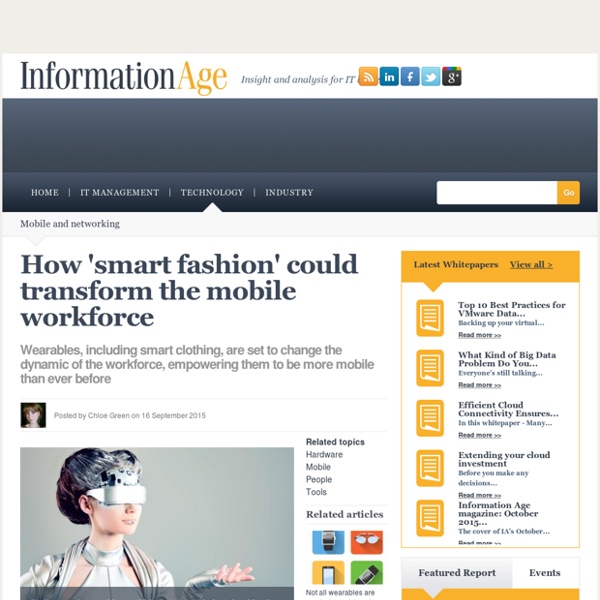How 'smart fashion' could transform the mobile workforce

Burberry turns to Snapchat before runway to debut London Fashion Week show
The first look at Burberry’s latest collection won’t be seen on the runway. Instead, the fashions will be previewed on Snapchat in what the designer is calling “the first ever" Snapchat fashion show. The luxury brand famous for its trench coats will give fans an inside look at its newest styles on its Snapchat account Saturday. The next day, Snapchat plans to feature clips from Burberry’s London Fashion Week runway show in the app’s “Stories” section. It’s a big play for Burberry to get the young adults and teenagers who dominate Snapchat to interact more with the brand. Snapchat has had a big digital presence during this week’s New York Fashion Week. The National Football League, Univision and Live Nation have also struck agreements with Snapchat to help promote their events. Burberry’s announcement included a rare statement from Snapchat Chief Executive Evan Spiegel, whose style preference is usually fashionable kicks, black jeans and a V-neck shirt.
New York Fashion Week springs forward with drones and other haute tech.
The drones at New York Fashion Week weren't exhausted fashion editors or undernourished models. Hovering overhead, the miniature aircraft carried cameras to film the shows of designers such as Cynthia Rowley and Rebecca Minkoff. They're not the only way cutting-edge technology is interfacing with fashion. Here are five brands that are celebrating its capabilities on the spring-summer 2016 runways. Rebecca Minkoff: With Marianne Faithfull as a muse and Intel drones as her witness, Rebecca Minkoff's show in New York crossed the miniskirts and mod jewelry of London in the 1960s with tech-cessories meant for millennials. Minkoff collaborated with Case-Mate on small leather goods that included a wristlet folio with built-in charging capability and a collection of Apple Watch bands — available now, ahead of French brand Hermes' options that debut in October. The embrace of Periscope coincides with Ralph Lauren's debut of a PoloTech wearable-technology smartshirt.
How "smart mirrors" are boosting clothing sales
Fitting rooms haven't exactly kept up with the times. Many are dingy, with bad lighting that makes almost anyone look worse for wear. But a new twist on the old fitting room basic is changing the way people shop for clothing, with upscale retailers finding so-called "smart mirrors" are actually boosting sales. Neiman Marcus, for one, is testing smart mirrors from maker MemoMi in three locations: Walnut Creek, California; San Francisco and Willow Bend, outside of Dallas. The new spin on the mirror comes as retailers increasingly are competing with online rivals for consumers' wallets. They can also email to friends or post their images to social media, in order to get feedback. Other retailers that are testing out new fitting room tech include Nordstrom and designer Rebecca Minkoff, according to The Associated Press. The new technology is raising concerns about data usage, however. © 2015 CBS Interactive Inc..
How Premium Fashion Brands Are Maximizing Their Social Media ROI
Social media and digital technology have forever changed the retail industry. In 2011, brands and retailers have reached a tipping point, digital innovations have decentralized commerce, and real-time consumer demand for designer merchandise has forever changed retail production cycles. Many fashion brands, mocked for their inability to move with the web because of a fear of accessibility, are no longer fighting the flow. Through their embrace of social media and social commerce, fashion brands are now innovating and profiting from their online marketing strategies. Luxury and premium brands are starting to lead the way for all retailers looking to connect with their customers and build online revenue channels. Fashion Brands and Social Commerce Online shopping is becoming a socially connected event. During the past year, the luxury market experienced a digital tipping point, with many brands rolling out new e-commerce sites, social media campaigns and mobile applications.
Related:
Related:



